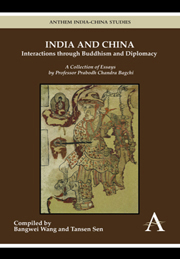 India and China: Interactions through Buddhism and Diplomacy
India and China: Interactions through Buddhism and Diplomacy Book contents
Khotan as the Cultural Outpost of India
from Part Two - Short Articles
Published online by Cambridge University Press: 05 March 2012
Summary
Forgetfulness would have been a bliss, if the subconscious had not retained the memories of the past to unloose them at the crucial moments. Past would have been a dead past, if the earth had not preserved in its bosom the ancient foot-marks to help its recovery. The desire of the modern scholar to dig out these marks has been as insatiable as that of the treasure-hunter of the olden days and there has often been an unprecedented competition among different nationalities in this search. This competition among scholars and archaeologists of various European countries led to the discovery of an enormous mass of materials from the deserts of Eastern Turkestan and within a short period of less than 25 years brought into focus lights from different quarters on the past history of this arid land.
The ancient Chinese records as well as the archaeological discoveries made in different places in Eastern Turkestan have unmistakably shown that the small kingdoms and principalities in this region had adopted Indian culture and preserved it as their own for about one thousand years. Buddhism was the accepted religion of the local people and script, literature, art and all other elements of culture had been mostly borrowed from India.
- Type
- Chapter
- Information
- India and China: Interactions through Buddhism and DiplomacyA Collection of Essays by Professor Prabodh Chandra Bagchi, pp. 185 - 190Publisher: Anthem PressPrint publication year: 2011


